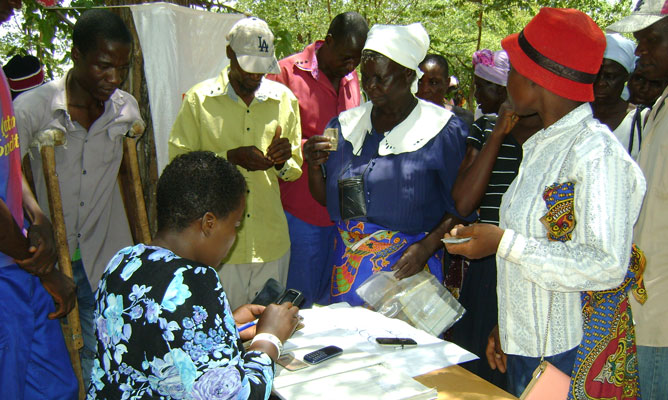
The Zimbabwe Red Cross Society (ZRCS) has scaled up its drought intervention programmes by introducing cash transfer programmes targeted at vulnerable people in drought-stricken communities.
Our Staff
The programme, which is being funded by the Danish Red Cross and American Red Cross, has brought relief to several families in the drought-prone districts of Muzarabani in Mashonaland Central and Mudzi in Mashonaland East.

ZRCS director of operations Karikoga Kutadzaushe said the cash transfer programme was going a long way in mitigating the impact of drought faced by families in the identified communities.
“The livelihood interventions will ensure sustainability and empowerment of the targeted households to buy food and reduce their vulnerability to droughts,” Kutadzaushe said.
“We are giving beneficiaries $48 every month through [Econet’s] mobile money transfer facility, EcoCash.
“The money is meant to help families buy basic food. There are 944 households in Muzarabani benefitting from the programme.”
Kutadzaushe said the selection of beneficiaries was informed by a community-based approach which was participatory and community-led.
- Chamisa under fire over US$120K donation
- Mavhunga puts DeMbare into Chibuku quarterfinals
- Pension funds bet on Cabora Bassa oilfields
- Councils defy govt fire tender directive
Keep Reading
“ZRCS ensured that the selection of beneficiaries was instructed by gender equality and diversity, and ensured non-discrimination in provision of food to the most vulnerable,” he said.
“Several government ministries as well as the District Civil Protection Units and the Drought Relief committees were consulted to inform the development of the selection criteria.”
In Muzarabani, the programme is being implemented in Maungaunga and Chiwenga wards, which are the most disadvantaged communities in the districts.
Danish Red Cross secretary-general Anders Ladekarl, who led the delegation to Muzarabani on Wednesday to assess the situation on the ground, told villagers that the money they were receiving was coming from Danish citizens.
“This money is coming from your friends in Denmark. They understood your challenges and decided to send you this money,” he said.
“We hope there will be more rain so that you harvest something.”
Ladekarl said the cash programme was due to end in April and they would reconsider funding the money-transfer programme again after that.
“This programme ends in April. However, we are not in a position to reconsider funding the programme again because the situation might improve.
“There are a number of factors we need to consider first before we make a decision,” Ladekarl said.
Hundreds of jovial villagers from Maungaunga and Chiwenga areas received their money transfers last Wednesday.
Villagers could be seen buying buckets of maize and basic food stuffs soon after getting money from EcoCash agents.
Kutadzaushe said 1 200 families were benefitting from the same programme in Mudzi.
“We hope to scale up this intervention programme so that we reach out to other disadvantaged communities in the country,” said Kutadzaushe.
Maungaunga councillor Oliver Ururu said the programme was a relief to many villagers.
“It is helpful to most of us here, especially the most vulnerable. I just hope we get more of such programmes to alleviate hunger in the area,” Ururu said.
According to the 2014/15 Zimvac report, rural food insecurity for the 2015-16 consumption year is estimated at 16% (1,5 million people) of the population during the peak lean season from January to March 2016, compared to 6% of the 2014/15 consumption period.
The government last week said the figure has since risen to three million.










